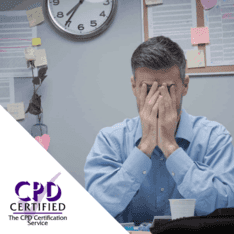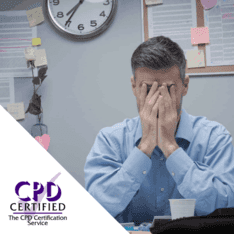What is work related stress and anxiety? Work related stress can take many forms. As well as leading to anxiety and depression, it often has a significant impact on performance and can take its toll on a person’s health.
Updated for 2022
There is strong evidence of longer term stress leading to conditions such as heart disease, gastrointestinal problems, persistent head, neck and back pain, as well as alcohol and drug dependency.
The figures can no longer be ignored as occupational stress is having an impact on all organizations of differing sizes and forcing many into reviewing and managing their Health, Safety and Wellbeing policies.
What causes stress in the workplace?
Stress should not be confused with pressure. Pressure applied correctly and with a positive aim or end result can be a motivating factor that leaves people feeling worthy and challenged. In return, this can lead to learning, growth and confidence.
Stress is often a symptom of poor employment relations which can and nearly always does affect productivity.
Healthy, well motivated employees can have a positive impact on the growth and success of a company, whereas stress will have the opposite effect including:
- poor workplace relations
- a fall in productivity
- increased sickness, absence and cost
- increased staff turnover, again leading to increased cost and further loss of productivity
- poor decision making
- increased accidents
- loss of work-pride leading to customer mistakes
Stress has a cumulative effect.
Like many illnesses, stress can have a cumulative effect. If one team member goes down with stress or a stress related illness, then that adds to the pressure of those covering the workload. Additionally, those acting as a manager of the team will also feel the extra pressure and in return may find it difficult to maintain a positive environment.
Therefore, it should be clear that there are many benefits to a business in promoting a healthy workforce, including:
- reduced sickness, absence and associated cost
- improved staff retention
- a reduction in accidents
- greater pride in work and increased quality
- a brand known for good service or products
- a higher workforce commitment and greater productivity.
What are the causes of work related stress?
There are many causes of stress at work. That’s not to say that every workplace is stressful, or every line of work is stressful, but people do spend many hours of their week in the working environment and if something is out of sync then it can cause disharmony and stress.
Typically, people who are suffering stress at work might be experiencing one or more of the following;
Lack of control.
When a person has limited control over the way they work or their environment then it often leads to frustration and stress.
Support.
Lack of adequate support from colleagues or managers.
Demand of work.
This can include pattern of work, workload, deadlines, lack of resources, client expectations, inadequate management support, penalties, expectations of managers and directors, lack of information.
Working relationships
Colleagues who are awkward, underhand or difficult, bullying and a lack of mechanisms to deal with such unacceptable behaviour, silent treatment, ignoring, isolating, malicious rumours, sense of judgment questioned, undermine integrity, having lies told about you.
Working Conditions.
Poor facilities such as consistent coldness or damp and excessive noise where there is no respite. This can wreak havoc on a worker’s mental well being as well as being a cause of major injury.
Adequate/ inadequate skill set.
Whether you have sufficient knowledge and training to fully deal with the task you are expected to complete.
Security and change.
Whether change is managed effectively can have a direct impact on a person’s feeling of security.
Behaviours of others. (Management).
Public humiliation, being given unachievable tasks, impossible deadlines, being set up for a fall, being yelled at, meaningless or unpleasant tasks, withholding or concealing information, not passing on messages, no credit where due, taking credit for other people’s efforts, constant criticism, belittling a person’s ability.
Working from home.
Working from home is a relatively new concept in the UK which has increased by the thousands since the start of the Pandemic in 2020. To a lot of employees it appears to be a very flexible way of working which has many benefits. To many others it is a source of extreme anxiety revolving around job security, loneliness, loss of esteem and confusion of direction of their career. Work from home anxiety is a very real threat to both employers and employees.
What are signs of work related stress?
Anyone can suffer from work-related stress irrespective of their industry, experience or level.
Although by no means exhaustive, below is a list of some of the signs of stress workers might experience.
Performance at Work
- loss of motivation
- decline in performance
- loss of interest
- increase in time off work
Emotional Signs
- irritability
- crying
- over sensitivity
- arguments
Aggression
- outburst of temper
- bullying
- malicious comments
- criticism of others
Social Behaviour
- alcohol increase
- increase in smoking
- nervousness
- social withdrawal
Physical Behaviour
- tiredness
- decline in appearance
- nervousness
- sweating
Out of Character
- arriving late
- leaving early
- volatile temper
- absenteeism
Assessing and dealing with your own stress at work
If you or somebody you know is exhibiting or experiencing the signs of stress, there are a number of things that can be done to address the challenge.
Try to be honest with yourself and identify the underlying cause. This may take a period of self reflection, but once identified or brought out from self-denial then it’s easier to tackle.
Try to talk to somebody trusted with whom you can share challenges and issues.
Practice relaxation techniques which have been proven to quiet the mind and bring clarity to a situation.
Improve diet and physical wellbeing. This may include exercise, eating better, reducing or quitting smoking/alcohol, caffeine and refined sugars. All of which can make a person over sensitive.
Avoid regular long hours, and make use of your holiday allowance.
Where possible seek additional support and guidance.
Training and CPD
HST have teamed up with an online partner to bring you health, safety and compliance training at very affordable prices. These courses available 24/7 so you can study at a time to suit you.
Further reading on this topic.
>> Work related stress and stress management – The role of the line manager in managing or creating stress and anxiety in the workplace.
>> Work from home anxiety – 7 top tips for improving your work-life balance
Recommended Reading
Work related stress and stress management






1 thought on “What is work related stress and anxiety?”